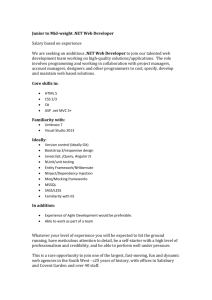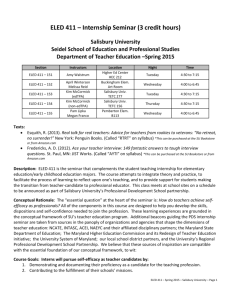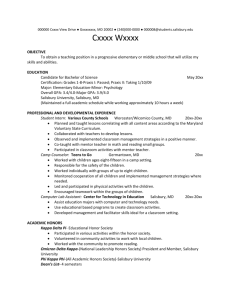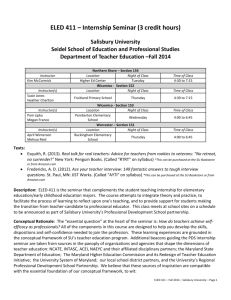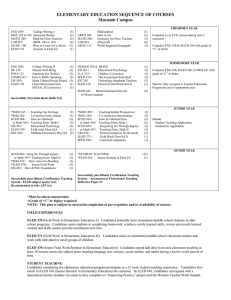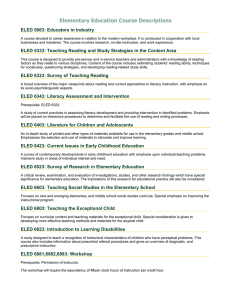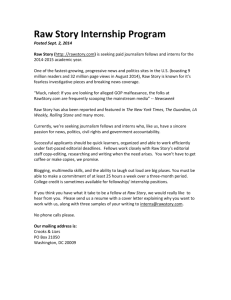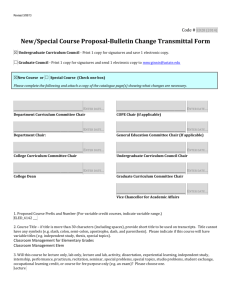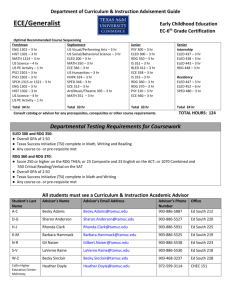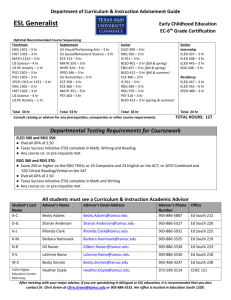ELED 411 – Internship Seminar (3 credit hours)
advertisement
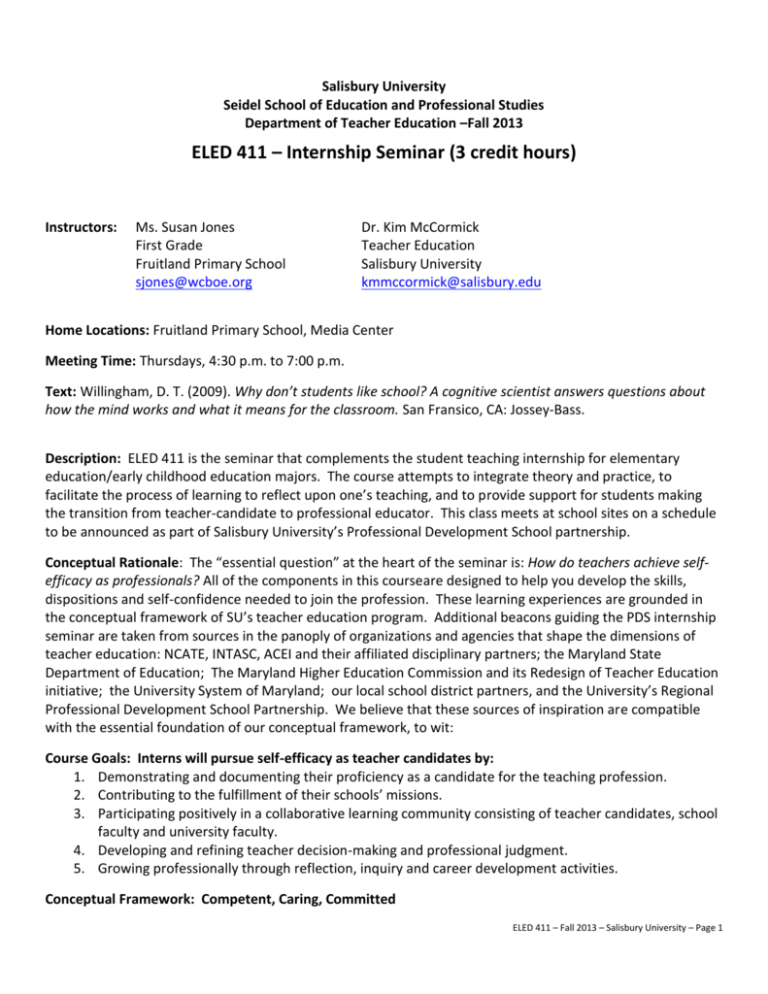
Salisbury University Seidel School of Education and Professional Studies Department of Teacher Education –Fall 2013 ELED 411 – Internship Seminar (3 credit hours) Instructors: Ms. Susan Jones First Grade Fruitland Primary School sjones@wcboe.org Dr. Kim McCormick Teacher Education Salisbury University kmmccormick@salisbury.edu Home Locations: Fruitland Primary School, Media Center Meeting Time: Thursdays, 4:30 p.m. to 7:00 p.m. Text: Willingham, D. T. (2009). Why don’t students like school? A cognitive scientist answers questions about how the mind works and what it means for the classroom. San Fransico, CA: Jossey-Bass. Description: ELED 411 is the seminar that complements the student teaching internship for elementary education/early childhood education majors. The course attempts to integrate theory and practice, to facilitate the process of learning to reflect upon one’s teaching, and to provide support for students making the transition from teacher-candidate to professional educator. This class meets at school sites on a schedule to be announced as part of Salisbury University’s Professional Development School partnership. Conceptual Rationale: The “essential question” at the heart of the seminar is: How do teachers achieve selfefficacy as professionals? All of the components in this courseare designed to help you develop the skills, dispositions and self-confidence needed to join the profession. These learning experiences are grounded in the conceptual framework of SU’s teacher education program. Additional beacons guiding the PDS internship seminar are taken from sources in the panoply of organizations and agencies that shape the dimensions of teacher education: NCATE, INTASC, ACEI and their affiliated disciplinary partners; the Maryland State Department of Education; The Maryland Higher Education Commission and its Redesign of Teacher Education initiative; the University System of Maryland; our local school district partners, and the University’s Regional Professional Development School Partnership. We believe that these sources of inspiration are compatible with the essential foundation of our conceptual framework, to wit: Course Goals: Interns will pursue self-efficacy as teacher candidates by: 1. Demonstrating and documenting their proficiency as a candidate for the teaching profession. 2. Contributing to the fulfillment of their schools’ missions. 3. Participating positively in a collaborative learning community consisting of teacher candidates, school faculty and university faculty. 4. Developing and refining teacher decision-making and professional judgment. 5. Growing professionally through reflection, inquiry and career development activities. Conceptual Framework: Competent, Caring, Committed ELED 411 – Fall 2013 – Salisbury University – Page 1 As a professional learning community, our charge is to serve our candidates and our local school partners. This mission is grounded in shared professional dispositions and in a tradition of caring that can be traced to the University’s origins as a normal school founded in 1925. There are four interdependent themes in this tradition that provide the foundation for our current practices and future growth: Informed and reflective pedagogy: We believe in teachers as decision-makers. Through careful preparation and a thorough grounding in research and best practices, we support candidates and collaborative partners who are disposed to question and reflect continuously in pursuit of sound educational judgments. Enhanced student learning: We celebrate human diversity and we are passionately committed to the belief that skilled and caring educators enhance learning and achievement when they recognize, appreciate and build upon the individual strengths and differences of every learner. Scholarship: We are committed to academic excellence, ongoing scholarly inquiry, and integrity – in our own work, in the efforts of our candidates, and by extension, in the primary mission of student learning in local schools. Collaboration: We believe that the integrated mission of preparing teachers, advancing the knowledge base, supporting teachers’ professional development and improving student achievement in P-12 schools can best be accomplished through synergistic partnerships. These partnerships must include all stakeholders in the greater educational community. Assignments/Requirements: Three focus lesson plans and reflections including video analyses (Arts Integrated, Technology Enhanced, Differentiated Instruction) *formally called “Showcase Lessons LiveText portfolio completed and reviewed at semester’s end Student Impact Study Reading Reflections Self-Analysis Reflection Assignment Mid-term Reflection End-of-semester Gallery Walk Attendance, Participation, and Professionalism 100 points each - 50 points for the lesson plan, 50 points for the analysis and reflection 100 points - Culminating representation of your professional growth that addresses standards (Physical Education and Health standard may be left blank) 100 points - Related to students’ academic achievement and/or aligned to a Professional Development School’s SLO (Student Learning Objective) component. 100 points - Weekly responses to discussion questions that relate to the course reading (10 points per reflection) 100 points – Three (3) 15-20 minute teaching segments (one near beginning, middle, and end of semester) must be videotaped and then a brief reflection/analysis of your teaching will be written. At least one video at each internship placement, could overlap with (1) focus lesson, 23 pages analysis/reflection per video segment 50 points - Online, anonymous post required midway through your internship 100 points - Held at Salisbury University to showcase Student Impact Studies, participation mandatory to pass ELED 411 150 Points - Weekly attendance required (5 points per seminar) and active participation and preparedness (5 ELED 411 – Fall 2013 – Salisbury University – Page 2 points per seminar) Grading Scale: A B C D F 100% - 90% 89% - 80% 79% - 70% 69% - 60% 59% - 0% Excellent performance – Reserved for the highest of accomplishments Praiseworthy performance Average/satisfactory performance Below average performance Unacceptable performance Additional Course Information: Some classes throughout the semester will be taking place “online” instead of as a “face-to-face” class. This is to allow for interns to have quality work time for assignments and requirements (i.e., Student Impact Study, LiveText Portfolio) of the course. When these online classes take place, interns are responsible for submitting two pieces of documentation through MyClasses: o 1) What plans do you have for your work session? (posted prior to the start of “class”), and o 2) What did you accomplish during your work session? (posted within 24 hours of “class”). If the county closes school, there will be no Wednesday seminar that evening and we will shift into “online mode” for that week. Refer to ELED 411 Calendar to determine weekly location of seminar and requirements for each meeting. All assignments must be submitted via My Classes with the exception of the Student Impact Study which is due at the Gallery Walk and will be uploaded to LiveText. The Gallery Walk will be held on Tuesday, December 3rd at Salisbury University from 3:30 p.m. to 5:30 p.m. Location is to be determined. In order to pass ELED 411, participation in the Gallery Walk is mandatory. It is expected that every intern will attend the full two hour Gallery Walk. *If this requirement is not met, interns will not receive a passing grade in ELED 411. Due the nature of ELED 411 being completed during internships, exact due dates for each assignment and requirement must be flexible to fit the needs of individual interns. It is expected that interns will complete and submit at least one major assignment each month. ELED 411 – Fall 2013 – Salisbury University – Page 3
